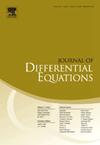BMO热方程Cauchy问题的全局时极大正则性及其应用
IF 2.3
2区 数学
Q1 MATHEMATICS
引用次数: 0
摘要
本文建立了经典热方程∂tu(x,t)−Δu(x,t)=f(x,t)在特定BMO条件下u(x,0)=0的Cauchy问题的全局时最大正则性,改进了Ogawa和Shimizu在[26],[27]中最初提出的局部时最大正则性。在进一步发展我们最初为热方程制定的方法时,我们得到了与Schrödinger算子L= - Δ+V相关的类似的全局bma -极大正则性,其中非负势V属于某些q>;n/2的反向Hölder类RHq。这个扩展包括几个不均匀的估计成分,如carleson类型估计的外力。我们的新方法是利用精细的热核估计,以及在涉及最大算子的积分型结构上的匹配时空分解,以及一些全局技术,如de Simon的工作和Schur的引理。一个关键的技巧是利用其中的平均振荡来为全局实时估计提供更高和必要的衰减阶数。本文章由计算机程序翻译,如有差异,请以英文原文为准。
Global-in-time maximal regularity for the Cauchy problem of the heat equation in BMO and applications
In this article, we establish global-in-time maximal regularity for the Cauchy problem of the classical heat equation with in a certain BMO setting, which improves the local-in-time result initially proposed by Ogawa and Shimizu in [26], [27]. In further developing our method originally formulated for the heat equation, we obtain analogous global BMO-maximal regularity associated to the Schrödinger operator , where the nonnegative potential V belongs to the reverse Hölder class for some . This extension includes several inhomogeneous estimates as ingredients, such as Carleson-type estimates for the external forces.
Our new methodology is to exploit elaborate heat kernel estimates, along with matched space-time decomposition on the involving integral-type structure of maximal operators, as well as some global techniques such as those from de Simon's work and Schur's lemma. One crucial trick is to utilize the mean oscillation therein to contribute a higher and necessary decay order for global-in-time estimates.
求助全文
通过发布文献求助,成功后即可免费获取论文全文。
去求助
来源期刊
CiteScore
4.40
自引率
8.30%
发文量
543
审稿时长
9 months
期刊介绍:
The Journal of Differential Equations is concerned with the theory and the application of differential equations. The articles published are addressed not only to mathematicians but also to those engineers, physicists, and other scientists for whom differential equations are valuable research tools.
Research Areas Include:
• Mathematical control theory
• Ordinary differential equations
• Partial differential equations
• Stochastic differential equations
• Topological dynamics
• Related topics

 求助内容:
求助内容: 应助结果提醒方式:
应助结果提醒方式:


